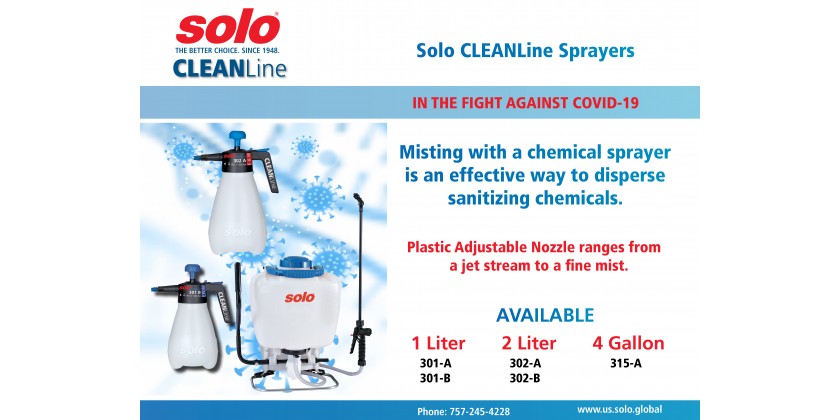
Three years ago, we wrote a blog about slowing down the spread of the flu with a pump sprayer. Today, that blog is more relevant than ever before but much has changed. COVID-19 revolutionized cleaning and disinfection protocols. When the pandemic began, health officials didn’t know much. Because of this knowledge gap, facilities maintenance personnel followed the cleaning and disinfection protocols based on previous coronavirus guidelines. [1]
Misinformation about how to disinfect was abundant. Before anyone had the chance to analyze the correct way to disinfect, or if increased disinfection was even effective, facilities and businesses rushed to secure the newest technology.
As the pandemic continued, more information surfaced. We learned that surface contamination wasn’t the primary way COVID-19 was transmitted. The World Health Organization even advised against excessive disinfection practices, such as fogging or misting outdoors. Surface contamination is not the main transmitter of COVID-19, but health organizations all over the world still encourage frequent cleaning and disinfection. Why? And what is the “right” way to disinfect?
The Right Way to Disinfect
Blindly spraying disinfectant over a surface isn’t effective and may be harmful. Proper disinfection should be targeted and focused on high-touch surfaces. The correct way to clean and disinfect is as follows:
1. Clean dirt and debris from the surface.
2. Apply disinfectant, let it remain wet on the surface as per the manufacturer’s instructions[2]
3. Wipe the surface
The chemical manufacturer’s label instructs the user on the correct way to use their product. They tell the user the dwell time based on what they are trying to accomplish, sanitizing or disinfecting, and with which tools to apply the chemical.
Choosing a disinfectant sprayer
Sprayers are one of many ways to disinfect a surface. Before the coronavirus, many people used to opt for trigger sprayers, but things have changed. Facilities maintenance personnel need to clean facilities more, and cleaning tools need to be efficient and fast to meet current cleaning demands. But how?
Efficient disinfection depends on the chemical application. Pump sprayers are highly efficient tools for cleaning and disinfection. The nozzle on certain types of pump sprayers allows you to change the spray pattern from a jet stream to a fine mist.
The fine mist setting on a plastic adjustable nozzle produces a fine mist that clings to a surface. Using a sprayer with a plastic adjustable nozzle will allow you to change the pattern from a jet stream to a fine mist for more consistent surface coverage. These sprayers deliver disinfectant to wider areas as well as hard-to-reach cracks and crevices.
Using a pump sprayer makes it easier to disinfect high-touch surfaces such as:
- Doorknobs
- Handrails
- Tables & Chairs
- Desks
- Keyboards
- Light switches
- Faucets
- And other common areas
Pump sprayers are an ideal choice for cleaning and disinfecting medical facilities, schools, nursing homes, office buildings, manufacturing plants, and other facilities.
[1]https://www.who.int/docs/default-source/coronaviruse/situation-reports/20200514-covid-19-sitrep-115.pdf?sfvrsn=3fce8d3c_6
[2]https://www.who.int/docs/default-source/coronaviruse/situation-reports/20200514-covid-19-sitrep-115.pdf?sfvrsn=3fce8d3c_6
